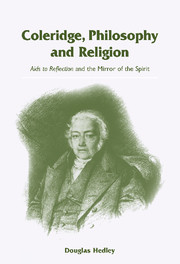Book contents
- Frontmatter
- Contents
- Acknowledgements
- List of abbreviations
- Notes on the text
- Prologue: explaining Coleridge's explanation
- 1 The true philosopher is the lover of God
- 2 Inner word: reflection as meditation
- 3 The image of God: reflection as imitating the divine spirit
- 4 God is truth: the faculty of reflection or human Understanding in relation to the divine Reason
- 5 The great instauration: reflection as the renewal of the soul
- 6 The vision of God: reflection culture, and the seed of a deiform nature
- Epilogue: the candle of the Lord and Coleridge's legacy
- Bibliography
- Index
6 - The vision of God: reflection culture, and the seed of a deiform nature
Published online by Cambridge University Press: 15 December 2009
- Frontmatter
- Contents
- Acknowledgements
- List of abbreviations
- Notes on the text
- Prologue: explaining Coleridge's explanation
- 1 The true philosopher is the lover of God
- 2 Inner word: reflection as meditation
- 3 The image of God: reflection as imitating the divine spirit
- 4 God is truth: the faculty of reflection or human Understanding in relation to the divine Reason
- 5 The great instauration: reflection as the renewal of the soul
- 6 The vision of God: reflection culture, and the seed of a deiform nature
- Epilogue: the candle of the Lord and Coleridge's legacy
- Bibliography
- Index
Summary
In him we live and move and have our being.
(Acts 17: 28)My great aim and object is to assert the Superhuman in order to diffuse more widely the faith in the Supernatural
(CCS, p. 44)I value and love his philosophy mainly because it has led me to this discovery, and to the practical conclusion, that those who are called to the work of teaching must cultivate and exercise their understandings, in order that they may discriminate between what is factitious and accidental, or belongs to artificial habits of thought, and that which is fixed and eternal, which belongs to man as man, and which God will open the eyes of every humble man to perceive.
(F. D. Maurice)William Paley argues upon the basis of Scripture and reason, confident that both agree and compliment each other. Signally lacking is any appeal to church or tradition. Coleridge's counter-principle is: ‘christianity without a church exercising spiritual authority is vanity and dissolution’ (Aids, p. 298) and he believes that the idea of ‘Original Sin’ will be taught as part of the ‘Science of Ethics, as taught by the clerisy, that is, the “permanent learned Class”’ (Aids, p. 295). Such utterances appear to be reactionary, and yet behind the rather Burkean exterior lies a quite radical (and perhaps eccentric view) of a group of educators, an organised body dedicated to the cultivation of society.
HUME, GIBBON, AND THE BASIS OF ‘ENLIGHTENMENT’
At the end of Aids to Reflection Coleridge quotes Paley's apparently Socinian account of the Christian religion.
- Type
- Chapter
- Information
- Coleridge, Philosophy and ReligionAids to Reflection and the Mirror of the Spirit, pp. 266 - 285Publisher: Cambridge University PressPrint publication year: 2000



